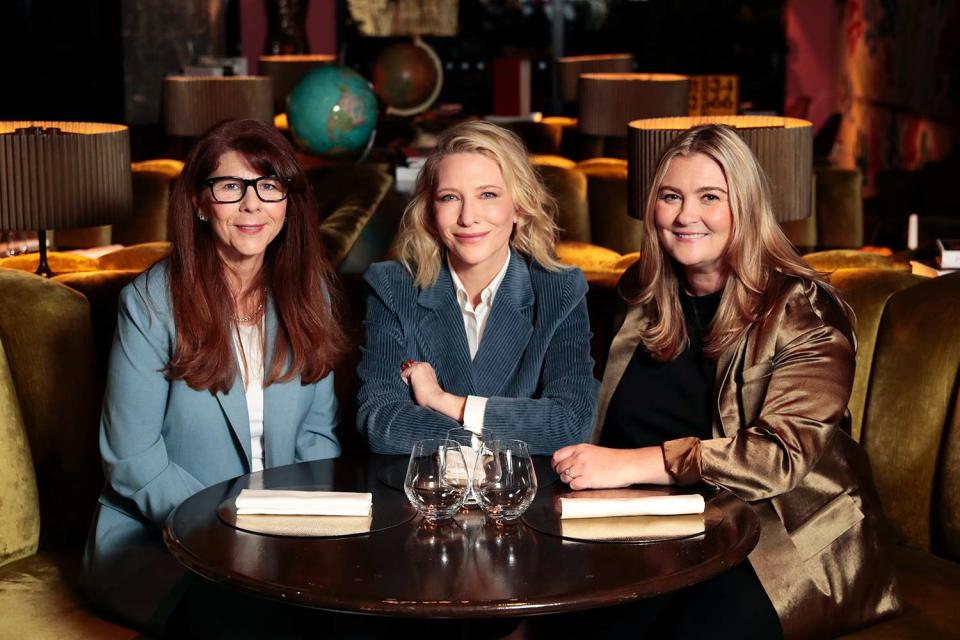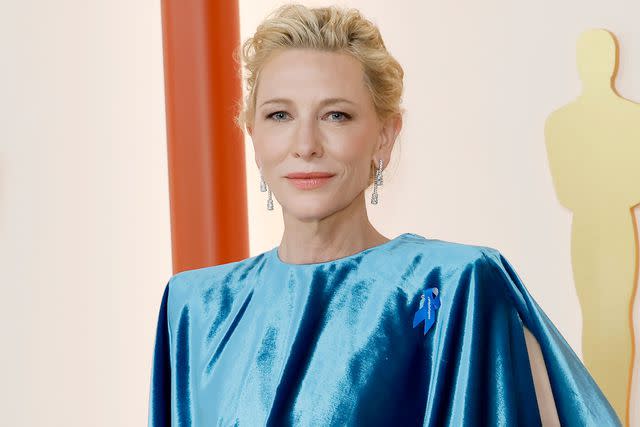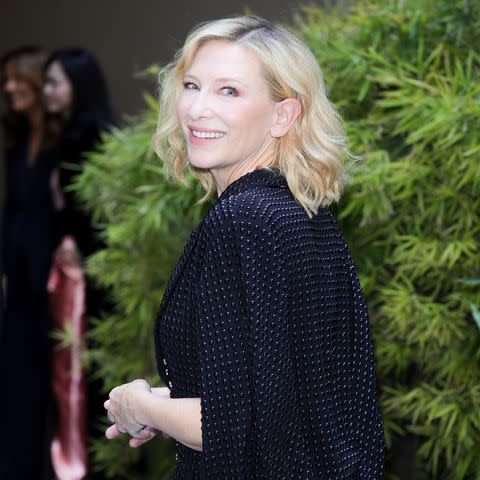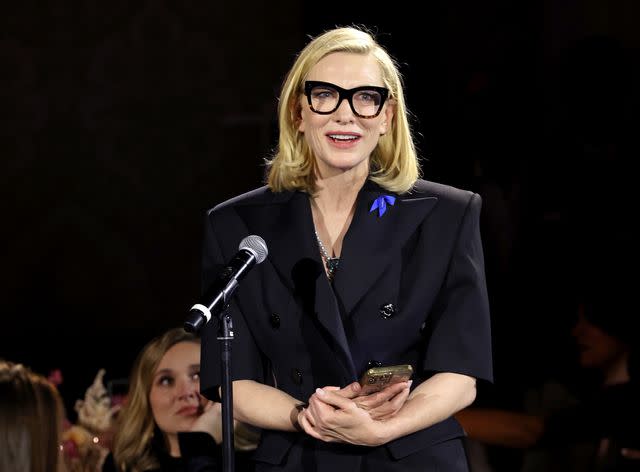Cate Blanchett Launching Program at USC to Empower Female Filmmakers: 'Really Exciting' (Exclusive)
- Oops!Something went wrong.Please try again later.
In an interview with program co-founders Dr. Stacy L. Smith and Coco Francini, the actress recalled a recent experience being the "only woman on set" of a film

John Phillips/Getty
Dr. Stacy L. Smith, Cate Blanchett and Coco FranciniWhile on a movie set recently, Cate Blanchett came to a shocking realization.
“I had assumed, because things have shifted, and we’re all talking the big talk about the way the industry has changed, that the set that I was going to walk onto would be diverse,” the actress, 54, tells PEOPLE. “I was not only the only woman in front of the camera, I was the only woman on set. My shoulders sank. I wasn't angry, I was disappointed."
At that moment Blanchett was reminded "you cannot be complacent” when trying to make change — and now she’s walking the talk.
In partnership with her Dirty Films co-founder Coco Francini (they run the independent film company with Blanchett’s husband of 25 years, Andrew Upton) and Dr. Stacy L. Smith, Blanchett has launched the Proof of Concept Accelerator Program at the University of Southern California in Los Angeles to support filmmaking talent whose stories promote the perspectives of women, trans and non-binary people.
"We've had so many moments where the achievements and the endeavors of women have been highlighted, that it makes me think we've moved, we've shifted," she says. "Then you look at the data that Dr. Stacy has compiled with the Annenberg Inclusion Initiative, and go, 'Things are not moving quickly enough.' "
"I think that's what motivated all of us to try and find a really functional, turbo-powered initiative that would help, from our perspective, tackle the challenges that we see. This initiative is really, really exciting."

While creating the program, Francini says they focused on breaking down the three major roadblocks they found women, trans and non-binary directors most often face when they're trying to get their careers off the ground: money, mentorship and exposure.
When the application for the program (supported by Netflix’s Fund for Creative Equity) opens in January, up to eight filmmakers will be selected to receive $50,000 in funding to create a short film that can serve as “proof of concept” for a feature film or television series.
"We've talked a lot about money, and that's something that women aren't often encouraged to talk about," says Blanchett. "When it comes to frequently marginalized voices, people feel that they don't know how to advocate for themselves financially. This program [will help] people realize through making a short film what their feature could be like so when they take it to a studio or a streaming service or whoever, they are able to budget it, and they know what to ask for and who to ask for that money."
Related: Cate Blanchett Jokes She Was a 'Nobody' 'Elbowed Out of the Way' at Her First Cannes (Exclusive)
Along with funding, program participants will also receive one-on-one mentorship and guidance from industry leaders, culminating in a project showcase to spotlight their work.
"They'll receive mentorship and oversight from not only the individuals from this team, but luminaries also in the industry," says Dr. Smith. "As Coco found out while interviewing so many women in the industry, it's so important to have a fellowship or a cohort. We really believe that this is something that can not only be a program that accelerates movement, but be transformative to the industry as a proof of concept for that first big feature and the resources needed to make it."
Related: Cate Blanchett Supports Sustainable Fashion (Again!) Wearing Archival Louis Vuitton at 2023 Oscars
While working on their projects, Francini wants to show these filmmakers they don't have to be put in a box.
"There are traditionally genres that women are pigeonholed into in terms of the stories that they're telling, trans people and non-binary people as well," she says. "We want to create opportunities for these people to direct all different kinds of films."
Blanchett also wants to show them they can "make works at scale."
"When I started out in the industry, the idea of a woman leading a narrative or being behind a camera was a niche experience that was somehow going to speak to a very small audience," she says.
"In terms of distribution, it wasn't resourced properly, so it was set up for failure in terms of not being able to reach a wider audience. So we're interested in expanding their access to audiences at every stage, through execution, development and marketing distribution."

Jacopo Raule/Getty
Cate BlanchettIn her experience, Blanchett has noticed people tend to get "risk-averse" about showing the perspectives of trans and non-binary filmmakers.
"We want to arm them with the tools to say: 'This is not a risk. This is going to add value to you as a company and to audiences who haven't seen something like this before,' " she says. "We're missing an enormous creative opportunity by not diversifying. We deplore creative laziness, we deplore financial laziness, and so we should therefore deplore a lack of inclusivity."
"Homogeneity in any industry is the death of progress and innovation," she continues. "That's certainly the case for the creative industries. When you walk onto a set that is homogenous, you can sort of taste the outcome. The things that breakthrough that are fresh, that have influence for the next decade, always start because someone took a risk on them."
Related: A Complete History of Every Best Actress Oscar Winner
According to the latest annual report from Dr. Smith and her Annenberg Inclusion Initiative, only 6 percent of directors across 1,600 top-grossing movies from 2007 to 2022 were women. Less than one third of all speaking characters on screen in those movies were girls, women, trans or non-binary people.
“There’s a cumulative disadvantage for women just because of their identity, not their talent," says Dr. Smith. "Because on every other indicator, how much they make at the box office, how well they score on Rotten Tomatoes, all other indicators are equal. So this [program] fills the missing gap financially, as well as rounding out many of the other components that emerging talent need."

Blanchett hopes the impact of the program lives on long after its conclusion.
"There are a lot of programs which are really important and can be a leg up, but then there's tumbleweeds after the program's finished," she says. "So by creating a cohort, you're actually creating a support network of collaborators who understand what's at stake and what's at play. They can self-generate between each other."
As they prepare to sort through applicants, Dr. Smith says, "We want to find the next Jennifer Kent of horror. We want to find the next Ava DuVernay of Selma. We want to find the next Greta Gerwig of Barbie. We want to find the next Gina Prince-Bythewood of The Woman King, so that we can retire this and move on to far more interesting, engaging and compelling artistic conversations."
Adds Blanchett: "We are hoping to find things that we could not possibly have imagined."
For more People news, make sure to sign up for our newsletter!
Read the original article on People.

